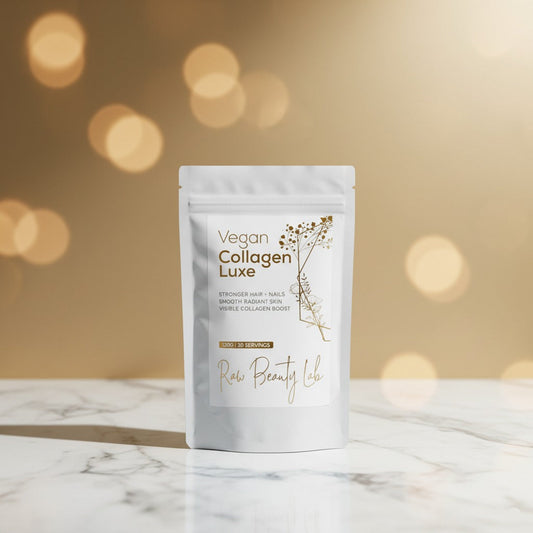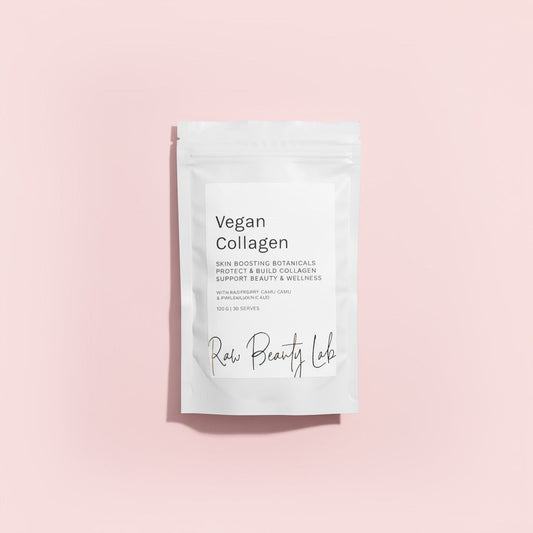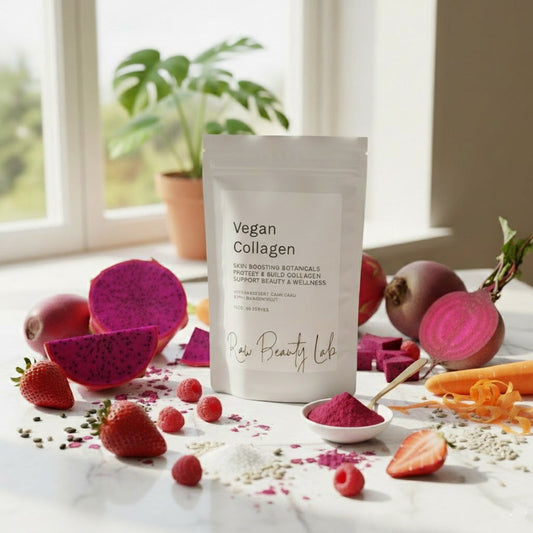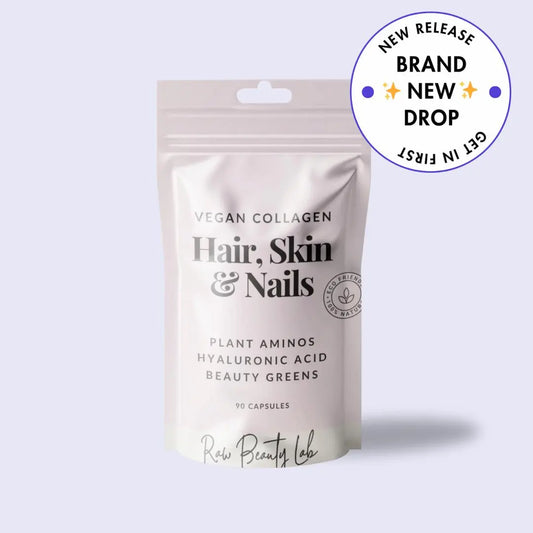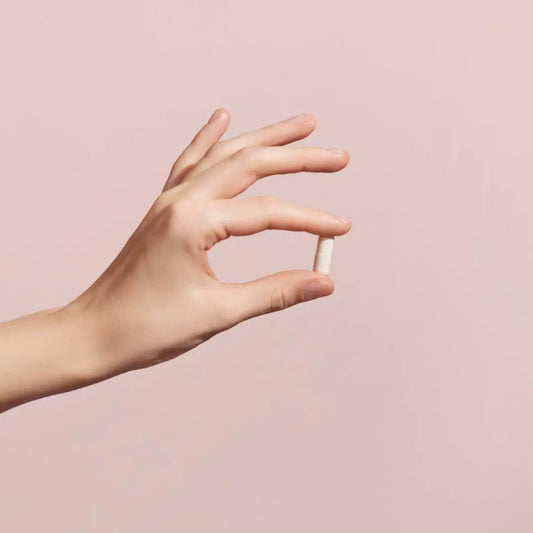Table of contents
So you’ve emptied several bottles of your wrinkle reversing serum but are yet to see a lasting noticeable difference. You’ve resorted to Google to find a more effective solution only to have your mind boggled by the plethora of information on the new beauty must-haves (don’t worry, you’re not alone!) Collagen supplements can work wonders for you if you know what you’re looking for. Lucky for you, we’ve trawled through the science to help you understand what collagen supplements are, how they work, when to expect results and what the best type of supplement would be to help achieve your beauty goals.
What is collagen and why is it important?
Collagen is the most abundant protein in the body, and one of the most important components of your youthful visage, with 75% of your skin consisting of collagen. It’s essential for keeping your skin plump and elastic and it’s responsible for providing bounce, firmness and structure (so you don’t have to paint your face with bronzer and look like a human hotdog to get cheekbones!).
Our bodies naturally produce collagen (yes - your body can produce collagen!), but our ability to produce collagen decreases around the age of 25. You may begin to lose anywhere between 1.7- 2.5% of your collagen each year - and the rate of collagen loss can depend on your diet (bye-bye biccies), and exposure to free radicals which can hasten the decline.
As we start to lose more collagen than we can make, the first signs of ageing begin to appear. As the skin loses some of its structural integrity, it loses its ability to ‘bounce back’ resulting in fine lines and wrinkles emerging around the eyes, forehead or around the mouth.
Unless you vow never to smile again after turning 25, there are two other very important methods you can employ to help minimise and possibly even reverse collagen decline:
1. Avoid collagen killers
2. Protect and build collagen with a supplement or dietary intervention
What are the benefits of taking a collagen supplement?
There is a growing (and very promising) body of research emerging on nutricosmetics - ingestible beauty products (no, not edible moisturiser!), that can deliver some pretty impressive anti-ageing and beauty boosting benefits.
A number of studies have shown that vegan and vegetarian collagen builders, as well as their animal collagen counterparts can help support a variety of anti-ageing outcomes.
Two separate scientific studies (1, 2) have shown that the key ingredients found in vegan collagen builders help to produce type I, III and IV collagen (the types prevalent in our skin), as well increase skin moisture to reduce the appearance of fine lines and wrinkles.
In a 2015 study (3), scientists found that animal collagen supplements could improve both skin hydration and the dermal collagen network with the potential to help boost skin youthfulness. Apart from maintaining your luscious locks and vivacious skin, collagen’s benefits extend through your entire body:
Skin
Collagen supplementation has been found to help boost skin elasticity, as well as keeping skin firm and hydrated. Beauty phytonutrients found in plants (and commonly found in vegan collagen builders) have the added benefit of protecting existing collagen from free radical damage as well as helping to lessen wrinkle depth and appearance (4)
Hair and Nails
As collagen production slows, hair and nails can become brittle and weak. Collagen can help hydrate your hair and nails, helping them grow faster and thicker (5). Collagen has also been shown to help regenerate dormant hair follicles, thereby stimulating hair growth and preventing hair loss (6). In addition, the antioxidants found in Vegan Collagen products may help to prevent or reduce greys.
Joints and Bones
Collagen is key to maintaining the integrity of your cartilage - the rubber-like tissue that protects your joints, and stops you sounding like an unloaded rifle going off every time you move. A number of studies have shown that collagen supplementation can help protect and support joints as well as lower inflammation (7).
Gut Health
Two of the amino acids found in collagen supplements, glycine and glutamine, may be particularly useful for gut health, as they're essential elements for rebuilding the tissue that lines our digestive tracts - healthy bowel movements are ridiculously underrated in maintaining overall wellness (it’s TMI but true!).
Lean and toned physique
Between 1–10% of your muscle tissue is composed of collagen, which helps to keep your muscles strong and functioning properly (I mean who wouldn’t want stronger muscles?). Collagen supplements can help provide essential amino acids which aid muscle growth and recovery following exercise (8), and save you waddling around after leg day like a penguin!
Which type of collagen is best?
There are many different types of collagen supplements available today so it can get pretty confusing to sort between what works and what doesn’t. The two major types of collagen supplements are animal collagen products (marine or bovine) and vegan (or vegetarian) collagen supplements.
Remember how your body naturally produces its own collagen? Well, the major difference between animal and vegan supplements is that animal collagen products contain collagen from fish or cow skin, whereas vegan collagen contains fruits, vegetables and seeds that provide your body with the right building blocks to build more of its own collagen.
Here is the low-down on the major varieties and what to look for in each:
Bovine Collagen
Bovine collagen is made from the skin, muscles, bones or tendons of cows (typically the parts of a cow that are not used by the food industry).
It contains mainly collagen types I and type III, which is similar to the content of your skin, so bovine collagen may be useful for reducing wrinkles, promoting elasticity, and increasing skin moisture (9).
Whilst bovine collagen boasts a number of beauty benefits, the environmental impacts are not so wonderful. Livestock production accounts for 14.5% of all human-induced green-house gas emissions, with beef contributing to 41% of those emissions (10).
Concerns have also been raised about the presence of contaminants in bovine collagen products. An independent audit found that 13% of animal collagen products tested contained contaminants likely present as a by-product of concentrated animal feeding operations, animal processing and air pollution (11).
Bovine Collagen Key takeaways
-
Highest carbon footprint of all collagen supplement
-
Similar to Vegan Collagen, Bovine Collagen will help reduce wrinkles, boost elasticity and increase skin moisture
-
Some concerns about contaminants and heavy metal content from farms - opt for organic only versions
Marine Collagen
Marine collagen is made from fish skins left over from food production (the stuff you wouldn’t normally eat). The skins are thoroughly washed, then hydrolyzed by an acid (typically ethanoic acid - also used in the manufacture of plastics 12, 13 ), and a food grade enzyme to yield marine collagen peptides, which have a low molecular weight for easy digestion and absorption.
Marine collagen does not contain type III collagen, unlike bovine collagen but does contain type II which is useful for joint support and may offer some beauty boosting benefits. It is also better absorbed than bovine collagen.
Be wary of marine collagen supplements in capsule or stick form, which often contain synthetic vitamins (which are not as effective as their wholefood counterparts) and can often also be packed with preservatives, fillers, and sweeteners often to mask the taste of fish.
Marine Collagen Key takeaways
-
Marine collagen has less impact on the environment than bovine collagen
-
Look for supplements that contain wild-caught fish vs. farmed fish
-
Be wary of supplements in capsule or stick form, which could contain bulking agents, preservatives, sweeteners or fillers
Vegan Collagen
Unlike marine and bovine collagen products, Vegan Collagen builders don’t contain any animal by-products and are instead packed with superfoods and beauty nutrients that help to build collagen naturally.
Specific plant-based nutrients found in vegan collagen have been shown to help your body to produce its own type I, III and IV collagen (14, 15). The added benefit of these plant-based wonders is they contain powerful anti-ageing antioxidants like anthocyanins, ellagic acid and carotenoids, which can help protect collagen and elastin from being damaged. They also help protect skin cells from the ageing effects of free radicals (present from you spending quality time with the sun!).
Vegan collagen products are minimally processed and are the most environmentally friendly collagen option available as they contain plant based compounds.
In addition, supplements containing beauty vitamins and nutrients sourced from wholefoods have been proven to help tighten skin and lessen wrinkle depth in women aged between 40 and 74 (16, 17, 18), packing an even stronger anti-ageing punch.
Vegan Collagen Key takeaways
-
Most environmentally friendly collagen supplement
-
Helps build collagen types I,III and IV and will help reduce wrinkle depth, improve skin tightness and elasticity and improve skin tone
-
Look for collagen supplements that contain wholefood sourced vitamins, rather than synthetic vitamins, which have been proven to be more bioavailable in over 50 independent studies.
Which collagen supplements work best?
We know that was a lot to digest (get it *wink*), so we’ve compiled a table of the key features and benefits of the major collagen supplement types so you can make an informed decision (you’re welcome!).
Are all collagen supplements safe?
As you’ve probably seen by now, not all collagen supplements are created equal. Whilst collagen supplements are generally considered safe, we recommend that you avoid using them during pregnancy and breastfeeding or otherwise check with your doctor or midwife first.
How long does it take for a supplement to work?
Unfortunately there’s no definitive ‘one size fits all’ duration for a collagen supplement. As collagen builders work with your body, and everyone’s body is different, the length of time before you see results can vary from 2 weeks to 6 months. However, there are things you can do to improve the rate at which see results! Reduce highly processed and sugary foods from your diet, drink more water, and be consistent with when you take the collagen supplement. And most importantly, be patient with your body as it adjusts to the new product.
Which collagen supplement is right for you?
The type of collagen supplement you choose will depend on your personal goals, your diet and your preferences of how the supplement works. Ultimately, the decision is yours, though we would recommend using supplements that have been clinically tested and back by scientific research. Naturally we’d recommended our very own Vegan Collagen because of its proven efficacy, its antioxidant fighting benefits, and the fact that it does all this without being a threat to our environment. Works for you, kind on the planet - what more could you want?


